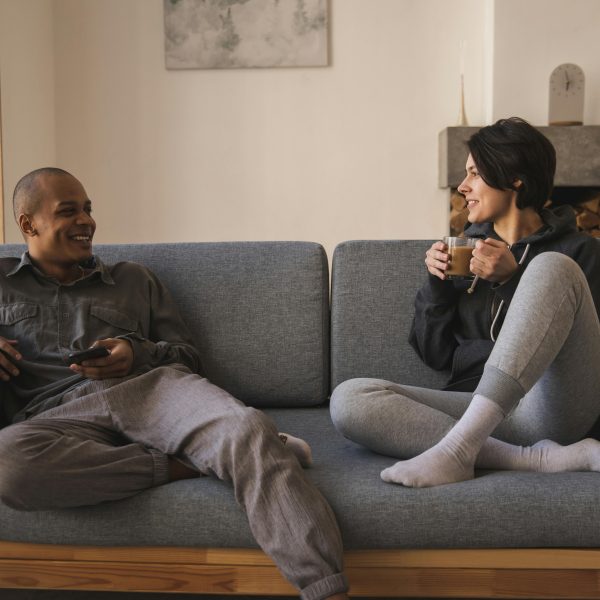If you’re in a committed and monogamous relationship, you might have questions if your partner suggests having an open relationship. To understand this better, knowing what an open relationship means is crucial. According to experts like Elisabeth Sheff, Ph.D., and Isadora Alman, an open relationship allows partners to have romantic, emotional, and sexual connections with other people outside their relationship. A study from 2018 found that about 4-5 percent of North Americans were in consensual, non-monogamous relationships.1 While non-monogamy can face social stigma, a study in the Journal of Social and Personal Relationships suggests that people in open relationships can be just as satisfied and happy as those in monogamous ones.
If the idea of non-monogamy is new to you, it can be a bit overwhelming. Take some time to think about your romantic goals and what you want from your relationship. Being honest with yourself and your partner can help you avoid future complications or lead to a more fulfilling connection. So, if your partner suggests an open relationship, you have the choice to decide if you’re okay with it or if it’s time to end your relationship with them. Keep reading to figure out if an open relationship is the right fit for you.
Know Your Partner’s Reasons
If your partner wants an open relationship, they should clearly explain why. Maybe they’ve struggled with monogamy before and prefer to be honest about their actions instead of hiding them. Or perhaps they believe their current needs aren’t being satisfied within the relationship and want to explore other options.
According to Alman, often, one person feels restricted, and sex in the relationship might have become unexciting. They may have unmet needs, either for a variety or specific desires their partner isn’t willing to fulfill. Once you understand why your partner wants an open relationship, you can decide whether and how to proceed.

Open Relationships Are Not the Same as Cheating
Cheating involves secrecy, dishonesty, and breaking the rules of a relationship. In an open relationship, both partners agree to be with other people outside their main relationship. It’s consensual and honest.
Evaluate Your Interest in Being With Other People
After understanding why your partner wants an open relationship, think about whether you also want to be with other people besides your current partner. If you do, and you both agree to it openly and honestly, then trying an open relationship might be a good choice.
Weigh the Possibility of One-Sided Monogamy
Consider if you’re okay with your partner being with others while you stay committed to them. Some relationships work this way; one person wants to stay monogamous, but the other doesn’t. You can find a compromise if you think you can handle it and are comfortable with certain rules, like only casual encounters or when your partner is away. However, if jealousy is a big issue for you, this arrangement might not be suitable.
Think About the Benefits of an Open Relationship
It can bring new experiences, satisfy curiosities, and maintain your primary relationship. Open relationships offer novelty, more connections, and a chance to try fantasies and discover new desires. They can also be helpful if you and your partner have different sexual needs or if seeing your partner with others turns you on.
Consider the Downsides of an Open Relationship
Problems often stem from issues in the primary relationship. If you and your partner aren’t genuinely comfortable with it or if you’re not honest and clear about your expectations and limits, it can lead to dissatisfaction. Also, it might not work if you’re only trying to save a troubled relationship, it might not work.
Think About the Quality of Your Current Relationship
An open relationship might be more feasible if it’s already strong and healthy. But if your relationship is already troubled, trying an open relationship can make things worse.

Set Rules and Boundaries
In any relationship, honesty and open communication are key. First, figure out your own needs and expectations. Then, talk with your partner to set boundaries that protect those needs. These rules might include how much you share about other relationships, staying safe, and how you spend time with others. Keep in mind that emotions can be hard to control, so be cautious about making rules about them. Regular check-ins can help ensure that both of you are happy with the agreements, and you can always change them if necessary.
Decide If This Is a Deal-Breaker
Ultimately, the choice of having an open relationship is yours to make. Even if you deeply love and care for your partner, you must also consider your own desires and needs when making this decision.
If you’re not entirely comfortable with the idea of an open relationship but also don’t want to end things, there’s another option. According to Sheff, if couples find it challenging to shift from monogamy to consensual non-monogamy, seeking help from a professional counselor, therapist, or coach can assist them in exploring and negotiating alternatives.
Remember, you have the power to shape the type of relationship that works for you. If monogamy is essential to you, then you should seek someone who shares that same value, just as your partner should find someone who fully embraces an open relationship if that’s what they desire.





